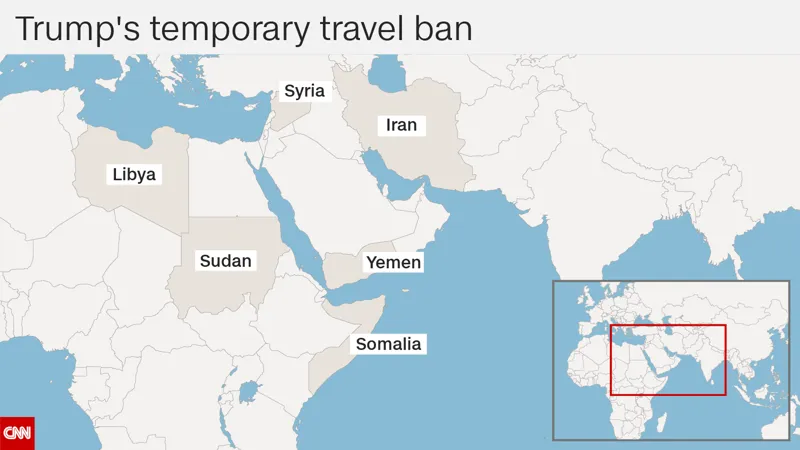In a striking continuation of controversial immigration policies, President Trump’s 2025 executive order has reignited debates surrounding national security and civil liberties. Titled “Protecting the United States from Foreign Terrorists and Other National Security and Public Safety Threats,” this directive not only expands on the infamous 2017 Muslim Ban but also introduces ideological exclusions that threaten the very fabric of American values. As the order allows the government to deny entry based on political beliefs and cultural backgrounds, it raises critical questions about the balance between safeguarding national interests and upholding the freedoms enshrined in the Constitution. This examination of the implications of such a policy is essential for understanding its potential impact on communities and individual rights.
| Category | Details |
|---|---|
| Executive Order Title | Protecting the United States from Foreign Terrorists and Other National Security and Public Safety Threats |
| Date Signed | January 20, 2025 |
| Purpose | To strengthen national security by controlling immigration based on ideological grounds. |
| Key Agencies Involved | Secretary of State, Attorney General, Secretary of Homeland Security, Director of National Intelligence |
| Countries Affected | Predominantly Muslim and Arab nations, specific countries to be identified in reports. |
| Legal Basis | Section 212(f) of the Immigration and Nationality Act (INA) allows the president to suspend entry of noncitizens deemed detrimental to US interests. |
| New Provisions | Allows denial of visas and removal of individuals based on political views, religious beliefs, or cultural background. |
| Impact on Visa Applications | Increased scrutiny and processing delays for applicants from high-risk countries. |
| Suspension of Refugee Program | Temporarily suspends the Refugee Resettlement Program for 90 days, affecting 1,660 scheduled Afghan resettlements. |
| Asylum Policy Changes | Individuals apprehended outside official entry points are ineligible for asylum and subject to immediate removal. |
| Historical Context | Echoes past discriminatory policies that targeted individuals based on ideology rather than real threats. |
| Community Response | American Arab and Muslim communities urge the administration to halt divisive actions that unfairly target them. |
| Call to Action | The need to stand against policies that threaten First Amendment rights and freedoms for all. |
Understanding Trump’s 2025 Immigration Executive Order
In January 2025, President Trump signed an executive order that many believe expands previous policies related to immigration, particularly those affecting Muslim countries. This order is intended to enhance national security but raises concerns about fairness and discrimination. It allows the government to deny entry or remove individuals based on their political beliefs or religious backgrounds, which can be seen as a modern-day version of the earlier Muslim Ban implemented in 2017.
The executive order, titled ‘Protecting the United States from Foreign Terrorists and Other National Security and Public Safety Threats,’ not only emphasizes security but also introduces ideological exclusion. This means that people can be denied visas or entry into the United States if their beliefs are seen as harmful to American interests. Critics argue that this approach unfairly targets entire communities and could lead to violations of First Amendment rights.
The Legacy of the Muslim Ban
The original Muslim Ban initiated in 2017 was highly controversial and faced numerous legal challenges. Many families were separated, and individuals seeking refuge or a new life in the United States were affected. Despite these challenges, the Supreme Court upheld the ban, highlighting the legal complexities surrounding immigration policies in the U.S. This new order appears to build upon that legacy, raising questions about its implications for future immigration.
In the wake of the 2017 ban, fears arose among various communities, particularly those from Muslim-majority countries. The targeted policies led to increased scrutiny of individuals based on their nationality and beliefs. As the 2025 executive order echoes the past, it risks reintroducing a culture of fear and uncertainty for potential immigrants and their families, which can have lasting effects on their well-being and sense of belonging in America.
Impact on Refugees and Asylum Seekers
One of the most troubling aspects of Trump’s new executive order is the temporary suspension of the Refugee Resettlement Program. This decision affects thousands of individuals, including Afghans who had been cleared for resettlement. The suspension not only halts their journey to safety but also sends a message that the U.S. may not be willing to uphold its commitment to helping those in dire need.
Additionally, changes to asylum policies mean that individuals apprehended outside official entry points will be denied asylum and face immediate removal. This shift can severely impact those fleeing violence or persecution, denying them a chance to seek safety. As a result, many may be forced to take dangerous paths to seek refuge, risking their lives in the process.
Increased Scrutiny and Delays in Visa Processing
Under the new executive order, individuals applying for visas from countries deemed ‘high-risk’ may face heightened scrutiny. This could lead to longer wait times and increased chances of delays or denials in visa applications. Such actions create a challenging environment for those wishing to enter the U.S., making it harder for families to reunite and for individuals to seek opportunities.
Moreover, the implementation of stricter vetting processes means that visa applicants may be subjected to more extensive background checks and interviews. This change can be particularly stressful for individuals who may already be anxious about their application status. Families and communities are left in limbo, unsure of what the future holds.
First Amendment Concerns and Ideological Exclusion
The new executive order raises significant First Amendment concerns, especially regarding freedom of speech and belief. By allowing the government to deny entry based on a person’s political views or religious beliefs, it creates a precedent that could undermine the core American values of freedom and tolerance. Critics argue that this move is contradictory to the principles that the U.S. has long claimed to uphold.
Furthermore, the ideological exclusion policies could lead to broader social implications, where individuals feel pressured to conform to certain views to gain entry into the country. This atmosphere of fear can stifle open discussion and debate, essential components of a democratic society. Protecting diverse opinions is crucial to maintaining a vibrant and thriving community.
The Role of Federal Agencies in Immigration Enforcement
The executive order assigns various federal agencies the task of identifying countries that pose national security risks. This inter-agency collaboration is intended to streamline the vetting process, but it also raises the stakes for immigrants from certain regions. The increased authority granted to these agencies can result in more aggressive enforcement actions against individuals already in the U.S.
As a result, legal residents from targeted countries could face removal based on ideological grounds, leading to fear and uncertainty within immigrant communities. This shift not only affects individuals but also impacts families and communities, as they navigate an increasingly hostile environment regarding immigration enforcement.
Community Responses and the Fight for Fairness
In light of these changes, many community organizations and advocates have come together to oppose the executive order. They argue that these policies unfairly target entire communities and violate fundamental rights. By voicing their concerns, they strive to raise awareness about the potential consequences of such discriminatory practices.
Activists emphasize the importance of standing up for the rights of all individuals, regardless of their background. They remind the public that the fight for fairness and equality is ongoing and that collective action is essential to ensure that everyone is treated with dignity and respect in the face of adversity.
Frequently Asked Questions
What is Trump’s 2025 executive order about?
Trump’s 2025 executive order expands the 2017 Muslim Ban, allowing the government to deny entry based on political, religious, or cultural beliefs, all under the pretext of national security.
How does the new order affect visa applications?
The order increases scrutiny for visa applicants from certain countries, leading to possible delays, heightened security checks, and potential travel bans for nations deemed high-risk.
What are the implications for asylum seekers?
Under the new policy, individuals apprehended outside official entry points are ineligible for asylum, facing immediate removal instead.
What does the order say about ideological exclusion?
The order permits the government to refuse visa applications based on perceived political views or religious beliefs, raising concerns about discrimination.
How does this order impact refugees?
Trump’s order temporarily suspends the Refugee Resettlement Program for 90 days, affecting thousands of individuals already cleared to resettle in the U.S.
Can the government deport individuals based on political views?
Yes, the new directive allows for the removal of individuals lawfully in the U.S. if they are deemed harmful based on their political or cultural beliefs.
What are the potential civil rights concerns?
These policies raise significant civil rights concerns, as they may undermine First Amendment rights and promote discrimination against targeted communities.
Summary
In February 2025, Professor Mohamed Arafa criticized President Trump’s new immigration order, calling it an extension of the 2017 Muslim Ban. This executive order allows the government to deny entry based on a person’s political and religious beliefs, targeting mostly Muslim and Arab nations. It grants authorities increased power to reject visa applications and deport legal residents under national security pretenses. The order has raised concerns about discrimination and violations of First Amendment rights, echoing troubling historical practices. Arafa urges resistance against these policies that threaten freedoms and encourage division in American society.



